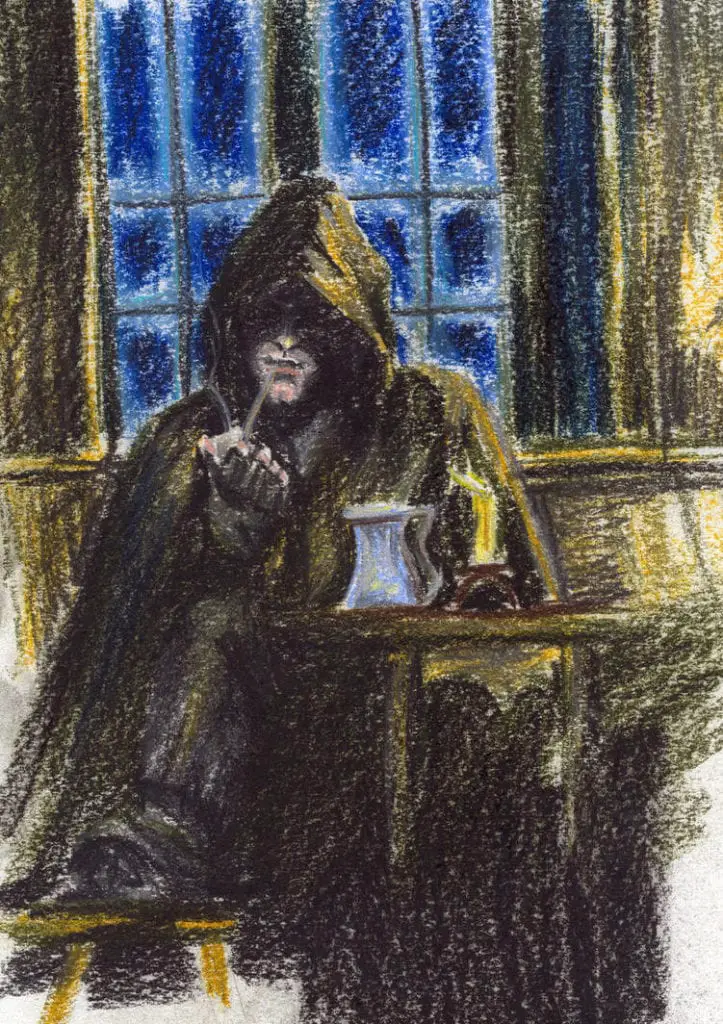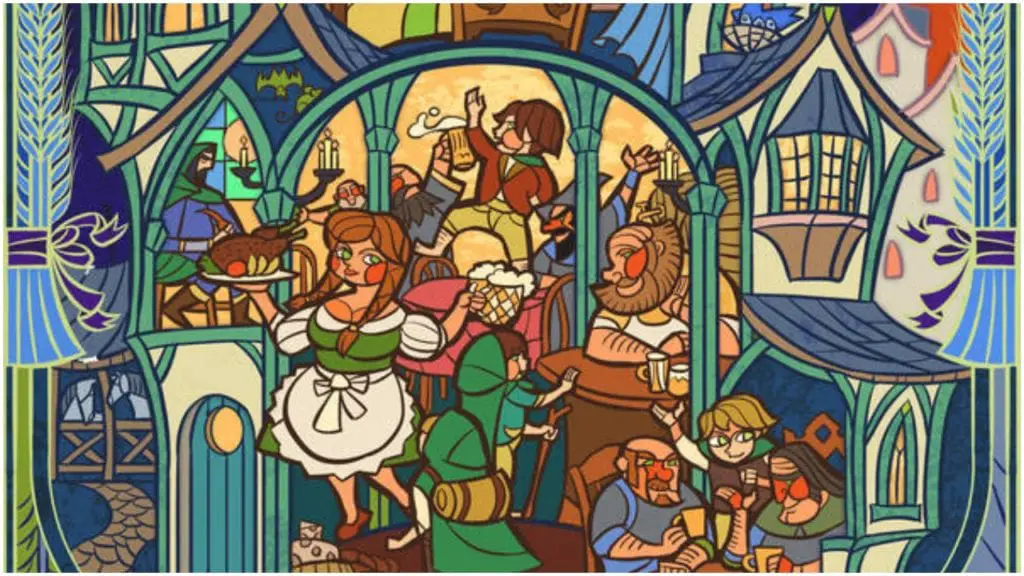A shorter essay for a shorter chapter this week, as we head into Return of the King: Endgame. [Note: after writing this and going back to edit, I have to shamefully admit that my essay on an eight-page chapter is not, in fact, shorter than any of the others. Tolkien has ruined me.]
“Homeward Bound” works largely to set up our last two chapters: the unrest in the Shire and Frodo’s fraught mental state. The languid, gentle melancholy of “Many Partings” hits some rocky ground, the slow slide in the Fourth Age demands some action and choice, and Gandalf fails to provide the professional courtesy of a two weeks’ notice. Let’s go back to Bree!
There Is No Real Going Back
“Many Partings” walks its characters along a reverse journey, retracing steps and coming across characters (and echoes) of their earlier adventures. It’s a pleasant, if somewhat sad, trip. “Homeward Bound,” in its opening pages, immediately inverts this story beat.
When they came to the Ford of Bruinen, [Frodo] had halted, and seemed loth to ride into the stream; and they noted that for a while his eyes appeared not to see them or things about him. All that day he was silent. It was the sixth of October.
The same thing happens to Frodo as they pass Weathertop: he refuses to look at the hill as they pass, draws his cloak closely about him as a storm blows in. Rather than finding comfort (or at least some bittersweet nostalgia) in familiar sights, Frodo is finding mostly pain and distress. Gandalf, as is his wont, notices. And he remarks that there are “some wounds that cannot be wholly cured.” Frodo agrees:
“I fear that it may be so with mine,” said Frodo. “There is no real going back. Though I may come to the Shire, it will not seem the same; for I shall not be the same. I am wounded with knife, sting, and tooth, and a long burden. Where shall I find rest?”
Gandalf doesn’t answer him: at this point there’s not really a helpful answer that he can give. Frodo feels better the next day, happy and cheerful. But this narrative inversion means there’s a grittiness present from the start of “Homeward Bound,” something caught in the gears of the previously smoothly-running Fourth Age. This is a good setup for the ending of our story on the personal level: poor Frodo has been shunted out of place by his experiences. He hasn’t been fated for the long goodbye of the Galadriels and Gandalfs of the world; he can’t seem to settle back into an active role in new experiences as we’re about to see with Merry and Pippin and Sam. It’s no coincidence the chapter ends with Frodo admitting that he feels like he’s falling back into a dream. Everything feels familiar but distant, irreconcilable with this altered version of himself.
Trouble in Bree
This is a good set up for the broader world as well: it gets externalized beyond Frodo’s own experiences as soon as the hobbits enter Bree. Everyone is carrying clubs and cudgels; The Prancing Pony is nearly empty. Barliman confirms the uncertainty:
“It’s like a bit of the bad old times tales tell of, I say. It isn’t safe on the road and nobody goes far, and folk lock up early. We have to keep watchers all around the fence and put a lot of men on the gates at night… there’s been worse than robbers about. Wolves were howling round the fences last winter. And there’s dark shapes in the woods, dreadful things that make the blood run cold.”
He later confirms that, if rumors are true, things aren’t going terribly well in The Shire, either. It’s a different scale, but we have the same tendency as before: comfort (even sadness-tinged comfort) giving way to a sense of danger and challenge.
On one level, this seems so unfair. Pippin, deeply understandably, had assumed they had left trouble behind by this point. Poor hobbits! Just let them relax, Tolkien. It’s been a very long year. But this is an important shift at the end of The Lord of the Rings, since this is a story of beginnings as well as endings. It’s okay for Gandalf, Galadriel, and the Elves to coast a bit in their retirement, saying goodbye to the Third Age as they make their way slowly to the Sea. It’s a bit of a passive look for them, but it’s supposed to be. “My time is over,” Gandalf tells the hobbits. “it is no longer my task to set things to rights, not to help folk to do so.” There’s just time for a bit of a farewell tour before the end.
Into the Fourth Age
But “Homeward Bound” shifts the focus away from this and looks squarely at the people who are going to begin the Fourth Age, and who have to make difficult choices and fight painful battles to make the world a good place to live in. This is clearest in Gandalf handing the reigns to the hobbits at the chapter’s end:
I am not coming to the Shire. You must settle its affairs yourselves; that is what you have been trained for… You will need no help. You are grown up now. Grown indeed very high; among the great you are, and I have no longer any fear at all for any of you.
Barliman adds his support too, noting that their travels have changed them, these mail-bedecked hobbits who “look now like folk as can deal with troubles out of hand.” We’ve talked a bit in the comments sections of previous chapters in Book VI about how Tolkien’s view of Aragorn’s reign stays largely aloof and hypothetical. There are few tricky or morally-fraught decisions; Aragorn is crowned, marries his immortal, beautiful elf-wife, and everything else seems to neatly fall into place. Yay!
“Homeward Bound” makes me more confident than I had been before that Tolkien was aware of this and was trying to address in the ways that he could. There is, frankly, no room at the end of The Lord of the Rings to establish the complexities of Middle-earth realpolitik in the Fourth Age. It would be weird! Given the story up to this point there simply is not room for it, in terms of tone, pacing, or theme. “The Scouring of the Shire,” I think, works both as an important character and thematic moment for our hobbits, but also as a microcosm stand-in for the broader picture of a Fourth Age Middle-earth. You can see this in Gandalf’s encouragement to Butterbur:
“Cheer up, Barliman! You have been on the edge of very great troubles, and I am only glad to hear that you have not been deeper in. But better times are coming. Maybe, better than you remember. The Rangers have returned. We came back with them. And there is a king again, Barliman. He will soon be turning his mind this way. Then the Greenway will be opened again, and his messengers will come north, and there will be comings and goings, and the evil things will be driven out of the wastelands. Indeed the waste in time will be waste no longer, and there will be people and fields where there was once wilderness.”
Different things are coming, and they are going to require challenge and work. There will be setbacks and sadness. These stories exist—as clear by the story’s name—beyond the scope of The Lord of the Rings. “Homeward Bound” and “The Scouring of the Shire” exist simply a small, contained glimpse of what’s to come. It’s a necessary capstone in a narrative universe where stories overlap and constantly spill into each other. After all, the Fellowship from the start was a mixture of past and present, young and old. Now half of them are picking up the mantle to continue the story forward. As Gandalf noted, after all, it’s what they were trained for. “Homeward Bound” is a little chapter but an important. It shifts our focus most definitively from the Third Age to the Fourth; it shifts the tone from passive to active.
(Thematically this works very well and is important to the chapter. I’m glad Gandalf leaves [sorry, Gandalf]. But man, if I were a hobbit I would be so annoyed? Furious. Oh, your age is over, Gandalf? You have to bail to go talk to Bombadil, Gandalf? Two of us just walked to Mordor for you, Gandalf).

Final Comments
- The lede has been buried: Bill the Pony is ALIVE AND HAPPY
- “[Bombadil] is a moss-gatherer, and I have been a stone doomed to rolling. But my rolling days are ending, and now we shall have much to say to one another.” I was curious about what Gandalf and Tom Bombadil chatted about as Gandalf abandons the poor hobbits to fend for themselves in the midst of a rural uprising. The internet was, too! Most people seemed to agree it’d just be a nice, long nostalgia-fest before the Fourth Age fully takes hold, with both parties being various levels of drunk and/or high. But I did like one person’s suggestion that Bombadil would have refused to talk about anything but Goldberry or lilies. Canon.
- “Well, this is the nicest chat I’ve had in a month of Mondays.” A good phrase. It was spoken on October 28th so this assertion carries some serious weight.
- Barliman’s face being “a study in wonder” at discovery that the shifty dude who skulked around his bar a year or so back is now KING OF THE WORLD is a nice moment. A long way since Bree where you did not like the look of me, indeed.
- Frodo has a rough go of things this chapter but by far the most distressing thing that happens to him is a bar full of strangers asking him if he has finished writing his book yet. Worth it though, as it results in one of the funniest Tolkien beats in a while: “He promised to deal with the amazing events at Bree, and so give a bit of interest to a book that appeared likely to treat mostly of the remote and less important affairs away south. Then one of the younger folk called for a song. But at that a hush fell and he was frowned down, and the call was not repeated.“ Long memories in Bree.
- Despite the fact that I’ve been keeping track of time I was a little startled that a year has passed in book-time but three-years have passed in real time? What have I done with myself? I have not destroyed any jewelry in a volcano. I have not joined the personal guard of any I have not entered into a mutual friendship with a tree. It’s going to be a challenging New Years that requires reflection. But really, all of you? This year? Be the Fourth Age you wanna see in the world.
- Prose Prize: Often they lingered in the fair woodlands where the leaves were red and yellow in the autumn sun. At length they came to Weathertop; and it was then drawing towards evening and the shadow of the hill lay dark on the road. Then Frodo begged them to hasten, and he would not look towards the hill, but rode through its shadow with head bowed and cloak drawn close about him. That night the weather changed, and a wind came from the West laden with rain, and it blew loud and chill, and the yellow leaves whirled like birds in the air. Poor Frodo.
- Next Week: Celebrate Boxing Day with me as we see the Shire get, just, really scoured.
Art Credits: Fan art for this chapter doesn’t seem to exist! Have some deja vu instead. Images, in order of appearance, are courtesy of Ted Nasmith, Jian Guo, and erzsebet-beast.


